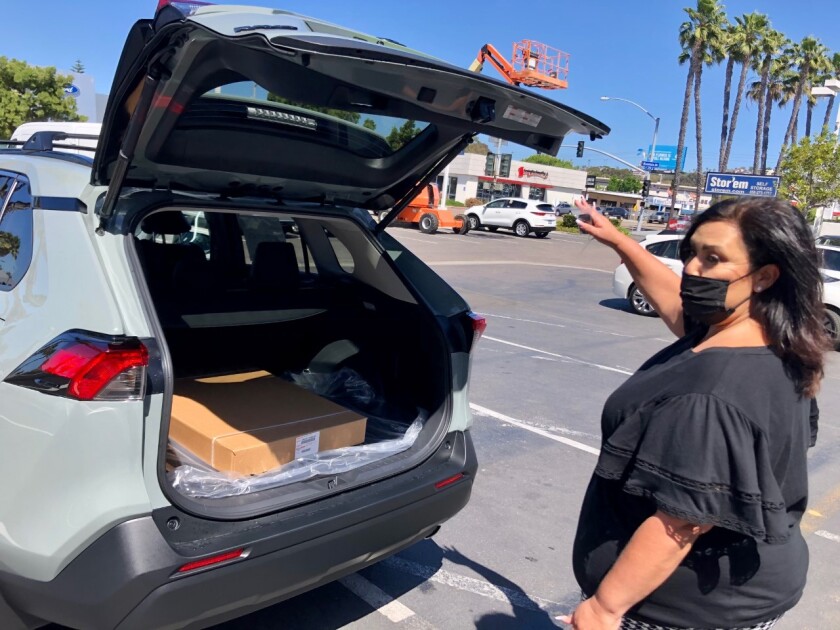Car Tent Sale in San Diego 2 18 18
A little more than a year ago, new car sales cratered as COVID-19 restrictions on businesses hit full stride. But the numbers steadily picked back up in succeeding months as dealers instituted pandemic protocols and customers whose incomes remained largely intact returned to showrooms across California.
Now, demand is back but dealers are faced with another problem indirectly related to the virus: There aren't enough vehicles on their lots because of a shortage of semiconductor microchips that go into cars and trucks.
"We normally have about 500 new cars and trucks on the ground and as of this morning, I'm at 57," said Gina Gonzalez, inventory manager at Mossy Toyota in Pacific Beach. "And I'm doing better than some of the stores in town."
Silicon chips essential for laptops, game consoles and TVs also go into the brake sensors, power steering, and navigation and entertainment systems in modern-day vehicles.
In the early days of last year's shutdowns, automakers slowed down production and semiconductor companies shifted focus to consumer electronics, which saw an uptick in demand for chips used in virtual learning, remote health care and working from home.
As the auto sector has recovered, semiconductor manufacturers have been unable to keep up with demand and fewer cars and trucks are rolling off assembly lines, even though Gonzalez said she and other dealers have plenty of customers eager to buy.
In January, before the chip shortage was acute, Mossy Toyota sold 299 new vehicles. In May, sales dropped to 121 — not for lack of demand but because there weren't enough vehicles in stock.
"Actually, we're not selling cars. The cars are selling themselves," Gonzalez said. "We're basically order-takers. Customers say, 'Do you have the right one in this model?' That's what we're doing."
In its just-released sales numbers for the first quarter, the California New Car Dealers Association bumped up its projections for new vehicle registrations for 2021 to 1.81 million but estimated the figure could have been 15 percent higher if not for the supply bottlenecks.
"With the inventory shortage, we're seeing the flip-side of the demand drop from last year," said Brian Maas, the association's president. "Now it's a supply drop and the hope is we can equalize demand and supply and get back to (2015 to 2019) where we're basically at around 2 million new vehicles sold" per year in California.
Maas said dealers hope the microchip shortage clears up within the next few months but Gonzalez said a district manager at Toyota estimated things may not get back to normal until the beginning of next year.
The best-selling new vehicle in California from January through March was the Toyota RAV4. The compact sport utility vehicle ended a long run at the top spot by the Honda Civic, underscoring a national trend in which consumers have increasingly gravitated from cars to roomier SUVs and pickup trucks.

Gina Gonzalez, inventory manager at Mossy Toyota in Pacific Beach, closes the trunk on a RAV4. The compact SUV was the best-selling model in California in first quarter of this year.
(Rob Nikolewski/San Diego Union-Tribune)
"The transformation of the vehicle market from what was a car-dominated market to a light truck-dominated market is complete in California," Maas said. "We were the last state to get there and we're pretty much following the rest of the country now."
Gonzalez said customers like the extra space and higher seating for drivers that SUVs and trucks offer. "I receive one or two RAV4s a week and I have 20 customers who want them," she said. "Normally, I get 25 to 50 RAV4s a week."
The first-quarter numbers saw the market share for hybrid and electric vehicles in the state rise to 20.6 percent, up from 15 percent in the last three months of 2020.
Leading the way was the all-electric Tesla Model Y, which finished third in overall sales, right behind the Toyota Camry. The Model Y is Elon Musk's entry into the compact SUV space and has a no-frills price of $39,900. Tesla's Model 3 finished 12th on the best-sellers list.
Registrations for all vehicles in the first quarter were down 2.9 percent compared to the same quarter last year, largely because sales were strong in the first 2 1/2 months of 2020 before the pandemic hit.
San Diego County, however, saw a 3.4 percent increase in sales compared to the first quarter of last year.
Between the pandemic-induced nosedive of 2020 and the inventory pinch of 2021, dealers like Gonzalez have been left shaking their heads.
"If you had told me a year ago we were going to go through this, I would have never believed it," Gonzalez said, "and I've been in the car business 25 years."
California's best-selling vehicles
1st quarter 2021
1. Toyota RAV4 (17,266)
2. Toyota Camry (15,526)
3. Tesla Model Y (13,786)
4. Toyota Corolla (13,180)
5. Ford F-series (12,978)
6. Honda Civic (12,942)
7. Toyota Tacoma (12,515)
8. Ram pickup (12,477)
9. Chevy Silverado (12,049)
10. Honda Accord (10,839)
Source: CNCDA/AutoCount data from Experian
Car Tent Sale in San Diego 2 18 18
Source: https://www.sandiegouniontribune.com/business/story/2021-06-10/after-coping-with-the-pandemic-san-diego-car-sales-have-a-different-challenge-lack-of-inventory
0 Response to "Car Tent Sale in San Diego 2 18 18"
Post a Comment